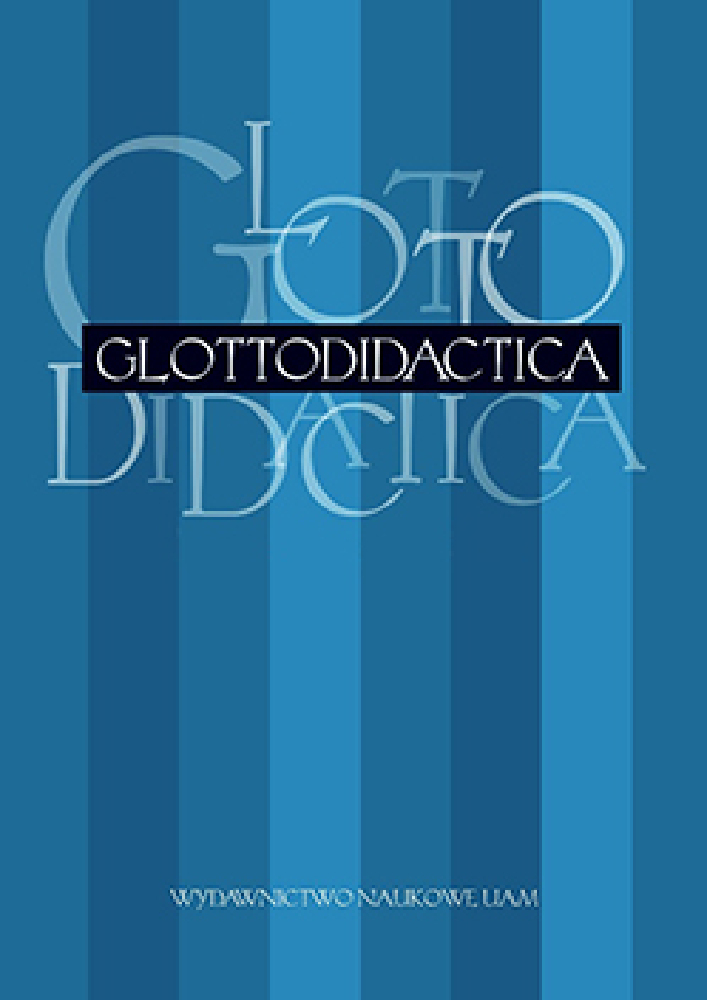Abstrakt
The paper analyses the ways in which the terms processes and strategies are defined within literature reporting verbal protocols on reading. The main argument presented concerns the fact that distinguishing between the two terms in not always based on the same criteria.Bibliografia
Block, E., 1986. The comprehension strategies of second language readers. In: TESOL Quarterly 20/3, 463–494.
Bråten, I. / Strømsø, H.I., 2003. A longitudinal think-aloud study of spontaneous strategic processing during the reading of multiple expository texts. In: Reading and Writing: An Interdisciplinary Journal 16/3, 195–218.
Cohen, A.D. / Upton, T.A., 2007. ‘I want to go back to the text’: response strategies on the reading subtest of the new TOEFL. In: Language Testing 24/2, 209–250.
Davis, J.N. / Bistodeau, L., 1993. How do L1 and L2 reading differ? Evidence from think aloud protocols. In: The Modern Language Journal 77/4, 459–472.
Ellis, R., 1990. Understanding second language acquisition. Oxford: Oxford University Press.
Ericsson, K.A. / Simon, H.A., 1993. Protocol analysis. Verbal reports as data. Cambridge, MA: MIT Press.
Green, A. 2009., Verbal protocol analysis in language testing research. New York: Cambridge University Press.
Jiménez, R.T. / García, G.E. / Pearson, P.D., 1996. The reading strategies of bilingual Latina/o students who are successful English readers: opportunities and obstacles. In: Reading Research Quarterly 31/1, 90–112.
Kendeou, P. / Muis, K.R. / Fulton, S., 2011. Reader and text factors in reading comprehension processes. In: Journal of Research in Reading 34, 1–19.
Kletzien, S.B., 1991. Strategy use by good and poor comprehenders reading expository text of differing levels. In: Reading Research Quarterly 26/1, 67–86.
Lau, K.L., 2006. Reading strategy use between Chinese good and poor readers: a think-aloud study. In: Journal of Research in Reading 29/4, 383–399.
Newell, A. / Simon, H.A., 1972. Human problem solving. Englewood Cliffs, NJ: Prentice-Hall.
Olshavsky, J.E., 1976–77. Reading as problem solving: an investigation of strategies. In: Reading Research Quarterly 12/4, 654–674.
Phakiti, A., 2003. A closer look at the relationship of cognitive and metacognitive strategy use to EFL reading achievement test performance. In: Language Testing 20/1, 26–56.
Phakiti, A., 2008. Construct validation of Bachman and Palmer’s (1996) strategic competence model over time in EFL reading tests. In: Language Testing 25 /2, 237–272.
Pressley, M. / Hilden, K., 2004. Verbal protocols of reading. In: Duke, N.K. / Mallette, M.H. (eds.), Literary research methodologies. New York: The Guilford Press, 308–321.
Scott, D.B. 2008. Assessing text processing: a comparison of four methods. In: Journal of Literacy Research 40/3, 290–316.
Yau, J.C. 2005., Two Mandarin readers in Taiwan: characteristics of children with higher and lower reading proficiency levels. In: Journal of Research in Reading 28/2, 108–124.
Licencja
Autorzy
Autorzy tekstów przyjętych do publikacji w czasopiśmie Glottodidactica są zobowiązani do wypełnienia, podpisania i odesłania na adres redakcji umowy o udzielenie nieodpłatnej licencji do utworów, z zobowiązaniem do udzielania sublicencji CC.
Zgodnie z umową, autorzy tekstów opublikowanych w czasopiśmie Glottodidactica udzielają Uniwersytetowi im. Adama Mickiewicza w Poznaniu niewyłącznej i nieodpłatnej licencji oraz zezwalą na użycie sublicencji Creative Commons Attribution-NoDerivatives 4.0 International (CC BY-ND 4.0).
Autorzy zachowują prawa do dalszego, swobodnego rozporządzania utworem.
Użytkownicy
Zainteresowani użytkownicy internetu uprawnieni są do korzystania z utworów opublikowanych od 2015 roku w Glottodidactica pod następującymi warunkami:
- uznanie autorstwa - obowiązek podania wraz z rozpowszechnionym utworem, informacji, o autorstwie, tytule, źródle (odnośniki do oryginalnego utworu, DOI) oraz samej licencji;
- bez tworzenia utworów zależnych - utwór musi być zachowany w oryginalnej postaci, nie można bez zgody twórcy rozpowszechniać np. tłumaczeń, opracowań.
Do wszystkich tekstów opublikowanych przed 2015 r. prawa autorskie są zastrzeżone.
Inne
Uniwersytet im. Adama Mickiewicza w Poznaniu zachowuje prawo do czasopisma jako całości (układ, forma graficzna, tytuł, projekt okładki, logo itp.).




